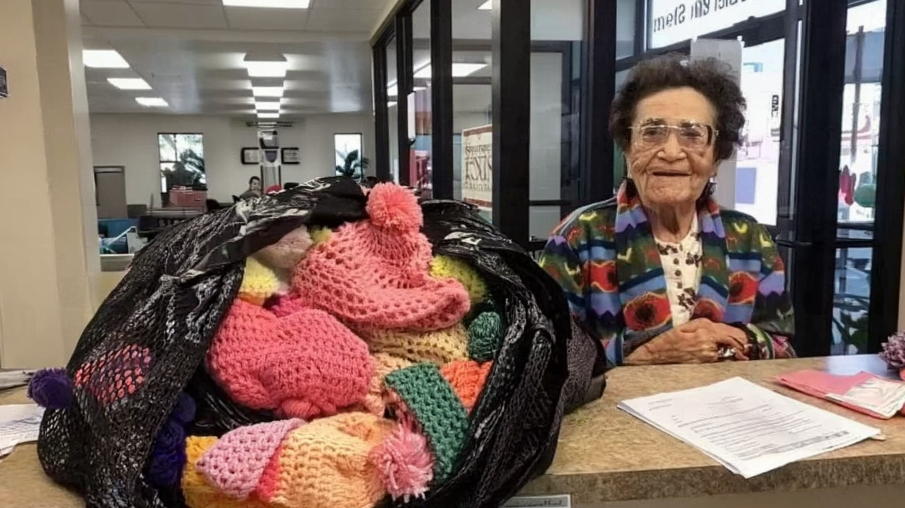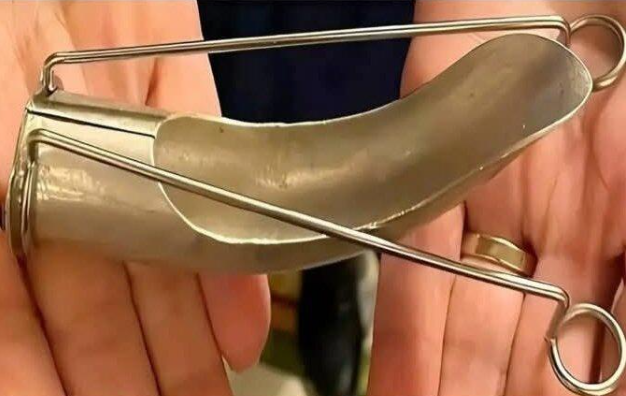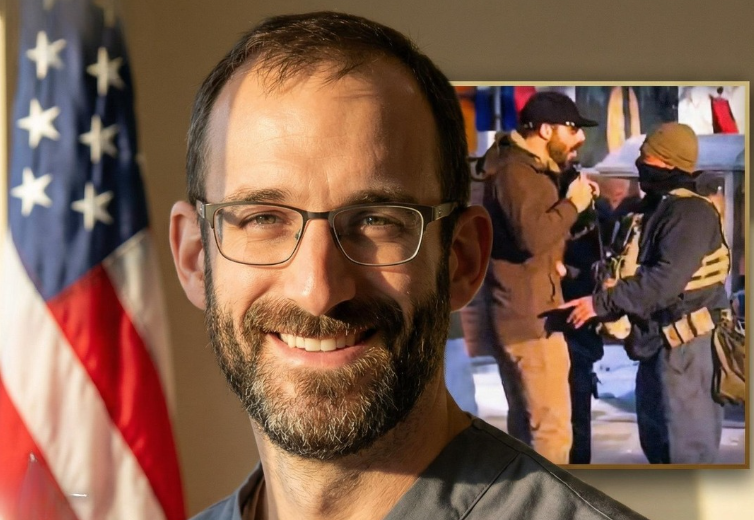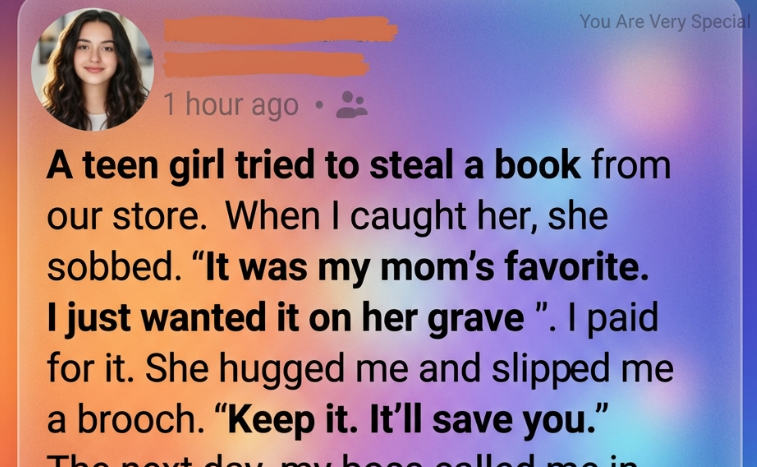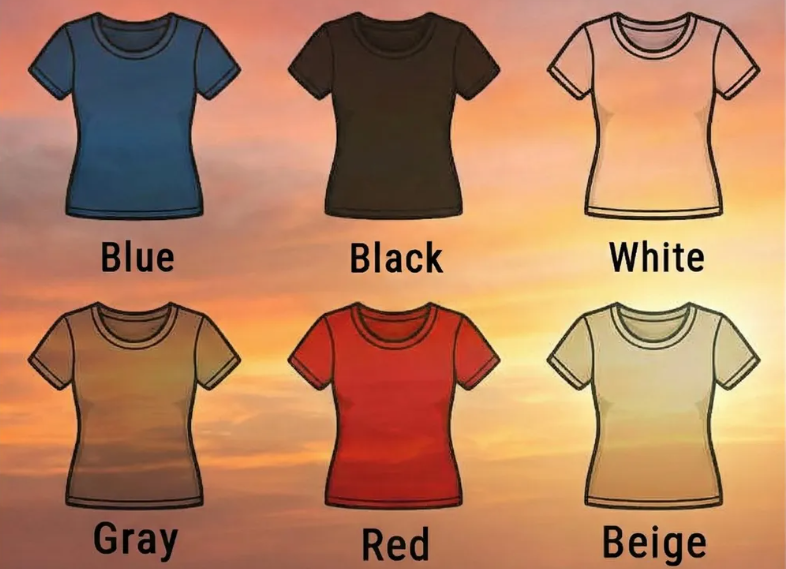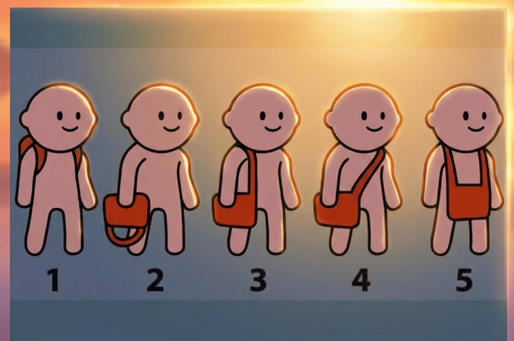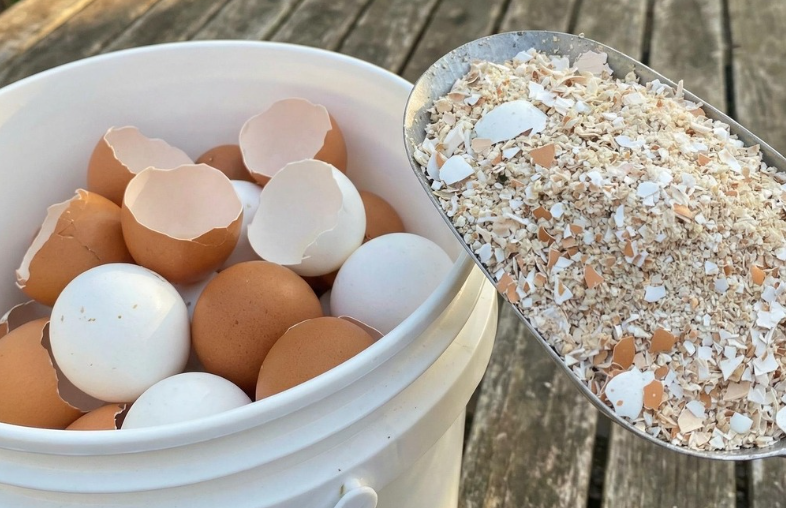Waiting at the shelter counter to complete a volunteer shift form, I noticed her stroll in—a small flowered coat, a huge black bag in hand, as though it weighed more than she did.
She possessed a calm presence, like someone who did not need to speak much to be seen.
The luggage landed softly on the counter.
I looked inside—dozens of hand-knitted hats in every pastel hue imaginable, each adorned with a tiny pom-pom.
Pink, coral, seafoam, peach—they resembled scoops of sherbet.
She remarked, “One for every month, plus a few extras.”
The receptionist grinned, evidently anticipating her arrival.
“You are precisely on time, Miss Ida.”
Miss Ida.
Evidently, she has maintained this practice for years.
Knitting throughout the year, distributing caps just before winter arrived.
No publicity, no fuss, simply warmth—both tangible and emotional.
I remained behind, calmly observing.
Although I’ve witnessed numerous contributions pass through here, something about this felt… distinct.
I approached to examine them again when she departed.
Atop the stack rested a gentle gray cap with a sky-blue border and a single word sewn within its fold: “Hope.”
For some inexplicable reason, I reached for it as though it were beckoning.
Then I discerned something almost concealed between the stitches.
No larger than a fortune cookie slip, a small letter.
It read: You are not by yourself.
Then my hands began to tremble.
Two days prior, I had nearly yielded.
My name is Samira, and recently life has not been particularly kind.
Following a protracted illness, my mother passed away this spring, leaving medical debts that seemed to utterly consume me.
Although some nights I sat at the edge of my bed and permitted myself to weep, as it all felt so overwhelming, I worked two jobs merely to maintain our small apartment.
Grief, duty, and loneliness imposed a heavier burden than any physical load.
Standing by the shelter desk that morning, I recalled my proximity to surrender.
Seated in my car beside the bridge, gazing down at the river, I contemplated whether complete release would bring solace.
Exhaustion, not courage or strength, compelled my inaction.
A pure, bone-deep fatigue.
That day I simply lacked the energy for any drastic action.
But today, wearing this cap, absorbing those words… it seemed as though someone understood.
As if someone knew something I could not even articulate.
Without a second thought, I tucked the hat inside my backpack, its softness beneath my fingers suggesting it held a unique power meant solely for me.
Over the next two weeks, I wore the hat everywhere—on my commute, during late-night shopping errands, even while volunteering at the shelter where I first encountered Miss Ida.
There was an essence about it that provided grounding, as if an invisible thread connected me to hope itself.
Each time I touched the brim, I recalled her note: You are not alone.
One night, as I was arranging canned goods in the cupboard, I heard her voice before I saw her.
Miss Ida had returned, arriving early to drop off another set of hats as the weather had grown colder faster than anticipated.
I immediately noticed her flowered suit and paused mid-task, a sudden anxiety arising.
Would she inquire about the gray hat?
Would she recognize it?
Worse still, what if she deduced I needed it more than anyone else?
I approached her first.
Gently gripping the hem of my sweater, I greeted, “Hi, Miss Ida,” “I wished to thank you for your gift. It holds immense significance for everyone here.
From her bag sorting, she looked up, her face illuminating with a pleasant smile.
“Hello there! You are one of the volunteers, aren’t you?”
“Yes,” I stated, nodding quickly.
Then… I indeed acquired one of your caps.
The blue-trimmed gray one.
Her expression softened, and she tilted her head slightly, observing me as if attempting to recall me.
“Ah, yes.” That one. She hesitated before asking, “Special, isn’t it?”
“It is,” I said, my throat constricting.
“There was a message within…”
Her eyes sparkled with understanding.
“Sometimes we infuse our creations with intentions, hoping they might reach an individual who most needs them.
Did it help?”
Tears stung the corners of my eyes, and I quickly blinked to restrain them.
“More than you comprehend.”
She touched my hand softly.
“Good.My sole desire is to convey to others that they possess greater strength than they perceive.”
With each passing week, I began to anticipate Miss Ida’s visits.
Every encounter revealed new stories and insights into her quiet wisdom.
It appears she began crocheting caps decades after the unexpected loss of her husband.
She once admitted, “I was uncertain what else to occupy my hands with.”
Consequently, I initiated the creation of something beneficial.
And in the process, I learned how to mend myself somewhat as well.
Motivated by her generosity, I expanded my contributions at the shelter—not only organizing supplies but also instructing children in the afterschool program and preparing weekend meals.
For the first time in years, I felt a sense of purpose.
Perhaps, just perhaps, I might navigate through another challenging period.
On a cold December afternoon, I arrived at the shelter to find Miss Ida already present, surrounded by volunteers unpacking boxes of holiday decorations.
She eagerly beckoned me over.
“Samira!
Come and observe our plans for tonight!”
I followed her to a corner of the room where a large cardboard box lay open, revealing bundles of yarn in vibrant hues.
She stated, “We are instructing anyone interested in learning how to knit their own hats.”
“Would you like to participate?”
Initially, I felt hesitant.
Me?
Knit?
However, I considered the comfort her creations had provided me—and many others—and I assented.
“Certainly.”
Why not?
We shared laughter and struggles for hours, our fingers awkwardly entwined with needles and threads.
By the end of the night, I had fashioned a lopsided red hat with a crooked pom-pom.
Despite its imperfections, Miss Ida clapped triumphantly.
“See?” You possess the inherent skill.
Later, as I packed away my belongings, she presented me with a small package.
“Here,” she stated.
“Something to commemorate tonight.”
Inside lay another small letter in her neat handwriting: “Hope grows when shared.”
Months later, spring finally arrived, melting the snow and bringing new blooms to the city streets.
Life still presented challenges; I continued to grieve and worked long hours, but a fundamental change had occurred.
I felt a lightness, a greater capacity to bear my burdens.
Whenever uncertainty arose, I retrieved that small letter and reminded myself, “Hope grows when shared.”
Ultimately, I resolved to extend the kindness I had received. I meticulously learned to knit correctly using leftover yarn from the session, thereby creating my own caps to contribute.
When winter returned, I stood alongside Miss Ida at the shelter counter, adding my small contribution to her already abundant bag.
We observed together as families selected hats, their faces radiating gratitude.
Amidst the assortment, I noticed a young woman placing a gentle grey cap on her head.
Tears welled in her eyes as she read the small message concealed within; these were not tears of sorrow.
They were tears of rekindled hope, of connection, of profound relief.
In that fleeting moment, I comprehended the true power of Miss Ida’s gift.
It was about reminding individuals of their inherent worth, not merely about providing warmth.
It conveyed that regardless of how bleak circumstances appeared, someone somewhere cared enough to send a message: You are not alone.
Life Lesson: Occasionally, the most subtle gestures of compassion can yield the most profound impact.
From a hand-knitted cap to a heartfelt letter, dedicating time to express empathy can transform lives—including your own.
Therefore, feel empowered to express your hope.
Give it forward.
Love expands when freely given.
Should this narrative resonate with you, kindly share it with others and offer your thoughts below.
Let’s propagate a bit more optimism today! Love.
